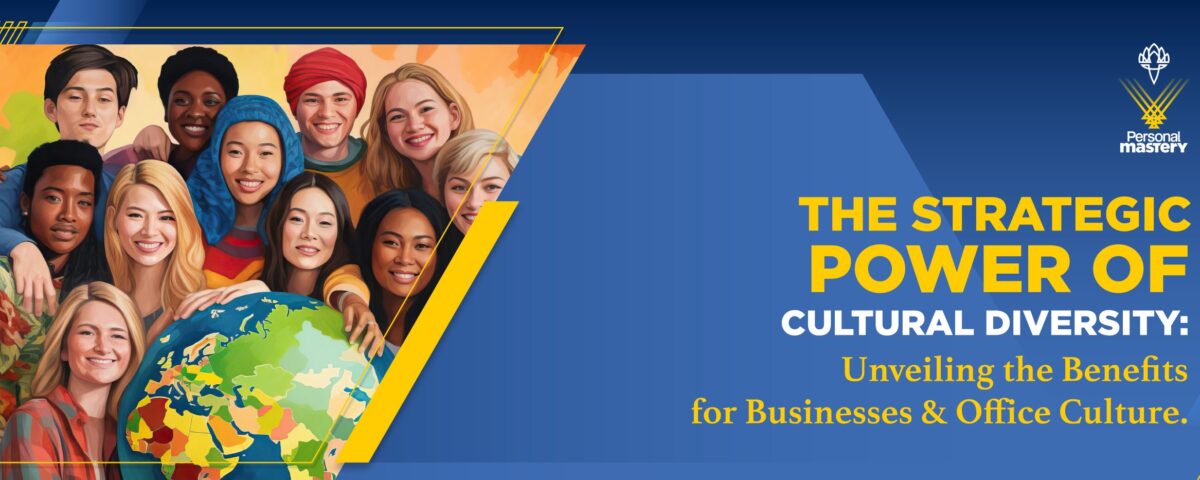
Ericksonian Hypnosis Certification Online: Mastering the Art of Suggestion
October 27, 2023
NLP Transformative Power: Boost Your Self-Esteem and Confidence
January 8, 2024In this article, we’re going to talk about why having a mix of cultures is important and how it can be good for businesses. We’ll explain what cultural diversity is, why it matters in the workplace, and how it can make a company more successful.
What is Cultural Diversity?
Firstly, Cultural Diversity means having people from different cultures and backgrounds in a group or society. Our culture is what makes us who we are—it shapes our beliefs, how we act, and our identity. So, when we talk about cultural diversity at work, it means having employees with various backgrounds, races, sexual orientations, and political views. This mix creates an inclusive environment where people from different backgrounds can work together as a team.
Why is this diversity important?
Well, it’s not just a trendy idea—it has real benefits. Research shows that companies with a diverse workforce tend to be more profitable.
In simple terms, having a diverse workplace lets businesses build teams with different viewpoints and skills. This diversity leads to more innovation and, in the end, helps companies make more money. So, it’s not just about talking about diversity—it’s about making it happen in the real world, especially during the hiring process.
Office Culture
Office Culture is important in any workplace as it brings a multitude of benefits that contribute to the overall success and strength of an organisation. A diverse workforce of creativity and innovation, as individuals from different cultural backgrounds bring unique perspectives and problem-solving approaches. This diversity enhances the collective intelligence of a team, leading to more effective and comprehensive decision-making.
Example: With Personal Mastery, the diverse cultural backgrounds of individuals seeking hypnotherapy may influence the way they perceive and respond to this holistic approach to health.
Beyond the immediate advantages, cultural diversity broadens the talent pool, allowing companies to attract individuals with rich skills and experiences. Having diversity in the office place not only aligns with ethical and legal imperatives but also enhances employee satisfaction by creating an inclusive environment where everyone feels valued.
Furthermore, in an era of global interconnectedness, cultural diversity equips businesses with the cultural competency needed to navigate international markets successfully. It is not just a checkbox but a strategic advantage that not only reflects the richness of society but also propels organisations toward greater adaptability, resilience, and success in today’s dynamic and competitive business landscape.
Cultural diversity in the workplace is a cornerstone of success in the modern professional landscape, offering many advantages beyond mere representation. Having a diverse group of people at work brings in new ideas. Each person has their own unique life experiences, and when we work together, we can solve problems and come up with different ideas. It’s like having a variety of tools to fix something – everyone contributes in their own way.
Also, having people of different ages is like having a team with a mix of old and new tools. The older tools, or more experienced workers, bring a lot of knowledge from their years of experience. This mix helps the team handle changes and challenges because everyone has different skills. It’s like being ready for anything that comes our way, and it helps the company grow by reaching new customers and keeping the ones we already have. So, having a diverse group of people at work is like having a toolbox full of unique and valuable tools that can fix, build, and improve things in many different ways.
Corporate Training:
Corporate training plays a crucial role in fostering a cohesive and productive multicultural workplace by addressing and harmonising diverse behavioural patterns. This becomes particularly essential as professionals from different cultural backgrounds come together, bringing with them distinct approaches to teamwork, decision-making, and leadership.
Culture Diversity with Behavioral Patterns and Differences:
Communication Differences: Effective corporate training plays a pivotal role in navigating communication variations among diverse teams. One notable example is the communication patterns between US and Indian professionals. US communication often tends to be direct, explicit, and task-oriented, while Indian communication may emphasise indirectness, implicitness, and relationship-building.
Understanding Behavioral Patterns:
In the area of corporate training, the acknowledgment and comprehension of diverse behavioural patterns are fundamental. Behavioural patterns encompass a range of actions, reactions, and communication styles that individuals develop based on their cultural upbringing and professional experiences.
Corporate training on Culture diversity extends its significance to understanding and harmonising behavioural patterns within a multicultural workplace. Behavioural differences may emerge in various aspects, such as teamwork, decision-making, and leadership styles. For instance, US professionals may exhibit a preference for individual achievements and assertive communication, while Indian counterparts may value teamwork and emphasise consensus-building.
Recognizing these distinctions through training helps build a cohesive and synergistic work environment. Training programs can provide insights into behavioural expectations, ensuring that individuals from diverse backgrounds comprehend and adapt to varied approaches, ultimately enhancing team dynamics and productivity.
Enhancing Cross-Cultural Communication:
The training can educate teams on recognizing and appreciating these differences, fostering a collaborative environment where diverse communication styles are understood and valued. An effective cross-cultural communication is a cornerstone for success in diverse workplaces. It involves understanding, respecting and navigating cultural nuances to foster clear and meaningful interactions among individuals from varied backgrounds.
Boosting Employee Engagement and Satisfaction:
Employee engagement and satisfaction are pivotal factors in fostering a positive and productive work environment. Organisations that prioritise these aspects often reap the benefits of increased productivity, innovation, and employee retention. To enhance engagement, it’s crucial to establish clear communication channels, provide opportunities for skill development, and recognize and reward accomplishments.
Additionally, creating a supportive workplace culture that values work-life balance, encourages collaboration, and solicits employee feedback contributes significantly to overall job satisfaction. By investing in the well-being and professional growth of their workforce, companies can build a motivated and contented team that is more likely to contribute actively to the organisation’s success.
Nurturing Inclusive Leadership:
By fostering awareness, understanding, and adaptability, these training initiatives contribute to a harmonious and productive workplace where individuals from different cultures collaborate effectively.
In embracing inclusive leadership with a focus on cultural diversity, organisations not only create a more harmonious workplace but also position themselves to thrive in a globalised and interconnected world where diverse perspectives are essential for sustained success.
In conclusion, the importance of cultural diversity in the office i.e.; Office Culture cannot be overstated. It is not just a box to be checked; it is a dynamic force that drives innovation, enhances decision-making, broadens talent pools, improves employee satisfaction, and positions organisations for success in an interconnected and diverse world. Embracing cultural diversity is not only a reflection of societal richness but a strategic imperative for building resilient, adaptive, and successful workplaces.
Personal Mastery’s corporate Training acts as a bridge, addressing communication disparities and behavioural variations within a diverse workforce.
Contact Us
Phone: +91-9592877000
Email Id: support@personalmastery.in
Address: #748, Sector 9, Panchkula (Chandigarh), Haryana (INDIA) – 134113


